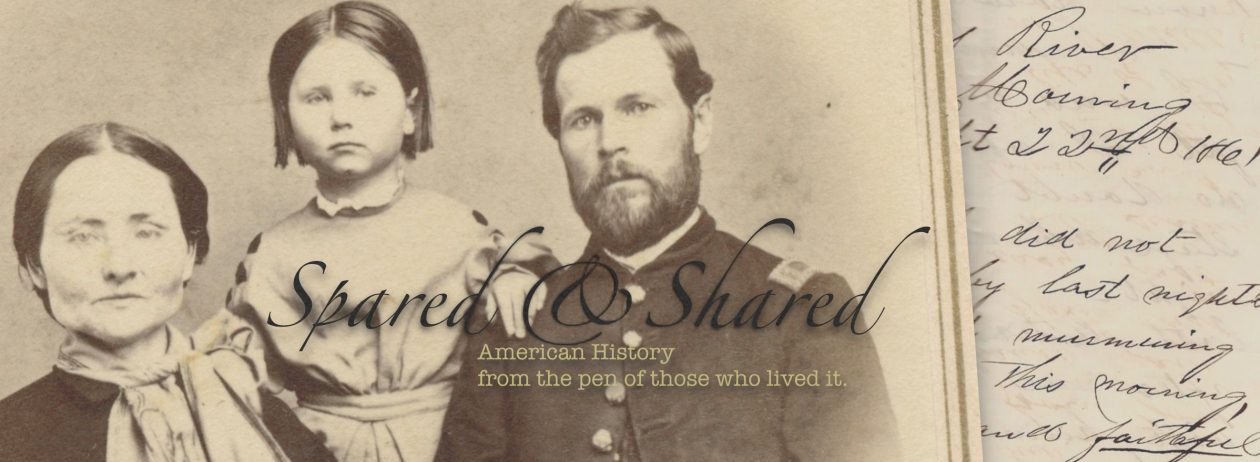
This letter was written by Allen Lovejoy (1838-1907), son of Andrew Lovejoy (1790-1850) and Sally Allen (1805–Aft1880) of Roseboom, Otsego County, New York—some 50 miles west of Albany, not far from Cooperstown. Allen enlisted in Co. G, 121st New York, in August 1862. At the time of enlistment Allen was described as a dark-haired, grey-eyed, 5′ 7″ farmer. Joining with him in the same company at the same time was his younger brother, John M. Lovejoy (1843-1900), who was wounded in 1864 but survived the war [see John’s war-time diary and six letters he wrote during the war]. Allen was transferred into Co. C of the Veteran Reserve Corps on 1 January 1865 and mustered out of the service on 3 July 1865 at Cleveland, Ohio.
Allen wrote the letter to his youngest brother, Jonathan D. Lovejoy (1846-1863), who served in Co. I, 152nd New York Infantry. Johnathan did not survive the war. He was discharged for disability after one year of service and died on 5 October 1863—some six weeks after this letter was written. [See 1863: Jonathan D. Lovejoy to his Mother]
[My thanks to Annaliese Vonheeringen for providing me with a first draft of this transcription.]
Transcription
Lovell General Hospital
Portsmouth Grove, Rhode Island
August 18th 1863
Dear Brother Jonathan,
I received your welcome letter of the 14th this morning & I was glad to hear that you was getting some better & was well enough to send a letter in your own hand writing again I hope you will soon get well enough to take your papers and bid Uncle Sam goodbye and go home and get well and be a help and comfort to Mother and Almira. I shall feel better if you get home, even if you are sick, than to know you was well & in the army, for I don’t think our folks will suffer if you get home as they did last winter for want of someone to take care of things. If you are at home—whether you can do anything or not—you won’t allow them to be run over [as] they have been after a years service in the army. I know that. And I hope you will just stand up for their rights & yours. If you do get home, just stand upon your dignity as a returned Union Soldier & if you hear a Copperhead blow, just blow him as high as a kite—whoever he is. That’s my motto anyhow.
Well Brother, John has gone and you may as well believe I miss him too. But I got a letter from you & him both this morning & I have answered his and now I’ll have to scratch to get yours ready for today’s mail. I am glad they both arrived at once for then I can let each of you know how the other does as well as myself. I told John all about you & now I will tell you what he says. He says it was very hot there & he was very tired and sweaty. They left here Friday and got to New York Sunday morning & he sat down & wrote to me as soon as they got there. They are in Fort Wood on Bedloes Island, New York Harbor. They had a good time going down there & Dr. Cornick got berths for all the boys on the steamer so they had a good place to sleep. He says the barracks there are not very good & they have no chairs or stands as they do here. He says they expect to leave there for the south in a few days, but don’t know certain when.
He saw Capt. Bingham on the East river steamer when they were crossing from New York to the island He says your regiment is 7 companies at Fort Schuyler & 3 at David’s Island but her don’t know which place Co. I is at. His letter was short as he was very tired but I was glad to hear from him & no less glad to get yours too.
We had a very heavy shower here Sunday just night. It rained a perfect deluge & the wards looked as if they stood in the ocean—the ground was covered with water so quick. It rained all night & yesterday & last night was cold enough for a frost, only for the sea breeze.
I have not got any letters from home since I last wrote so there is no news to write from there & as there is nothing here that will interest you & as the hour is drawing nigh for the mail to close, I will close too, hoping this will find you well enough to take a journey to old Otsego once more, a free man. And I hope nothing will ever tempt you to leave home again—to enslave yourself when you can get rid of it. You leave two brothers in the service, & having done your duty like a man before age required it of you. Let some of the lay backs at home take your place and you rest from your labors & you will feel a conscious pride that you ever left a good home & kind friends in spite of a couple of brothers entreaties to serve the country of your birth and defend our Glorious Flag. All honor to such Noble Patriotism that is willing to defend Liberty with life. These are the feelings of an affectionate brother & may God bless & protect my noble brothers, Jonathan & John.
Write soon, — Allen









